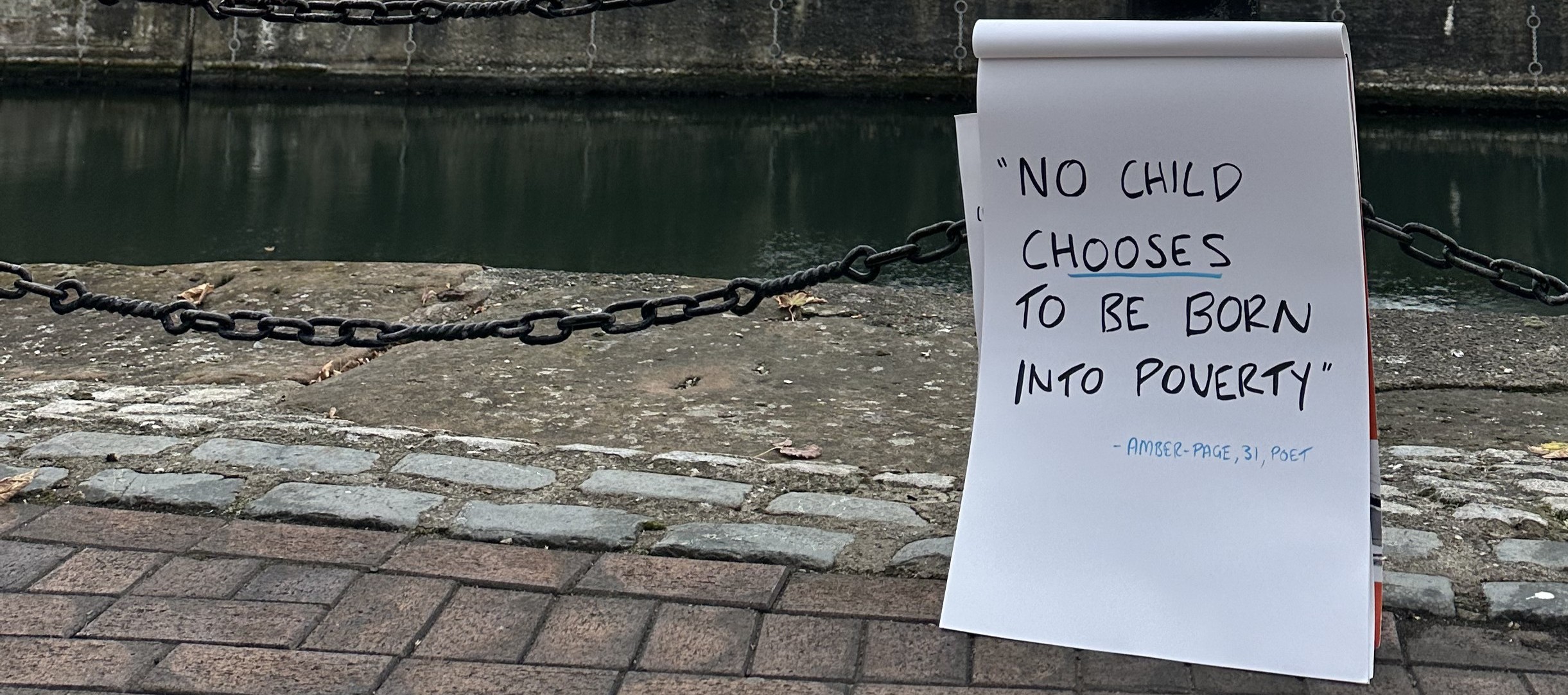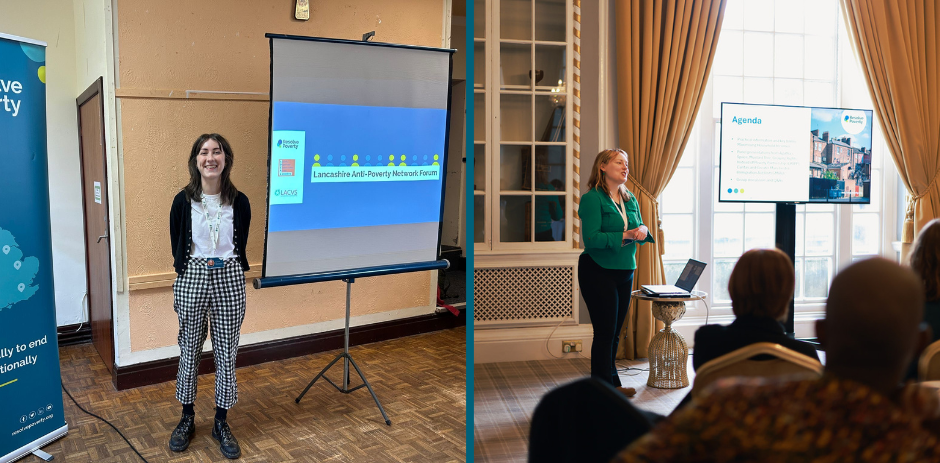By Tom Pottrill (Policy Officer), Patsy Davies and Dr Hannah Haycox (Network Development Coordinators) at Resolve Poverty
A whole-system approach to tackling poverty requires all partners – operating across different sectors and along different geographic levels – to play their part in delivering better outcomes for low-income residents. Although the ‘big levers’ for addressing poverty may lie with national government, poverty rates and the factors that impact those rates vary substantially by place. Its resolution hence requires grounded knowledge, of local issues, experience and conditions, and practice-centred knowledge; what works in one place may not work in another.
In this article, we outline our recommendation for regional anti-poverty partnerships to be convened in each English region, setting out how the Lancashire Anti-Poverty Network (LAPN) and Income Maximisation Anti-Poverty Partnership (iMAPP) in Liverpool City Region – both established by Resolve Poverty – provide an archetype for its delivery.
Our Mission Critical report proposes regional infrastructure organisations, independent of the public sector, establish anti-poverty partnerships to convene a range of partners constituent to the regional footprint: the regional authority, local authorities, regional public bodies – such as NHS ICPs, public transport and employment support bodies – and voluntary, community, faith and social enterprise (VCFSE) sector and private sector partners.
Our work through LAPN and iMAPP reaffirm the importance of place-based approaches to tackling poverty: no two regions are the same; local context matters. It is vital, therefore, that partnerships are established where the energy for anti-poverty activity already lies; in some regions, that may be with the public sector and in others it may be with the VCFSE sector.
Although regional anti-poverty partnerships should be built upon existing foundations, their structural integrity depends on buy-in for the local anti-poverty agenda across all public and VCFSE sector partners. With strong underpinnings in place, partnerships can facilitate a shared understanding of different bodies’ roles and responsibilities, support public bodies to embed poverty reduction and prevention as a strategic priority and help coordinate anti-poverty activity across all parts of the system. Thus, by helping secure alignment in partner priorities and ensuring all levers are pulled in the same direction, anti-poverty partnerships should steer continuous improvement in the efficacy of public and VCFSE sector action and, by definition, deliver continuous improvement in outcomes for those experiencing poverty.
At Resolve Poverty, through LAPN and iMAPP, we are working in close collaboration with local and regional partners to add value to existing cross-sector strategic approaches to tackling poverty in Lancashire and Liverpool City Region. Here’s how.
Lancashire Anti-Poverty Network (LAPN)
The Lancashire Anti-Poverty Network was established by Resolve Poverty in partnership with the Lancashire Association of Councils for Voluntary Service and has gained a membership of hundreds of professionals across the region. With members from both the public and VCFSE sector, the network sets out to establish partnerships and connections across organisations and communities already engaged in anti-poverty initiatives. This has been vital to building the strength of, and expertise within, the network. Indeed, its success depends as much on collective working across organisations as it does operating within existing areas of strong anti-poverty activity.
The VCFSE sector in Lancashire has historically been the bedrock of anti-poverty activity across the region, with many crisis response services running exclusively through this sector. Here, VCFSE organisations are well-informed to speak to the nature of poverty in their areas, and consistently adapt their responses to best serve the needs of their communities. The unique strength of the VCFSE sector also lies in its ability to offer insight and expertise to public sector professionals with the power and scope to implement both regional and district-level anti-poverty responses. And, crucially, the public sector in Lancashire recognises the value of these contributions: Lancashire County Council are currently consulting VCFSE organisations on the re-design of their Crisis Support Fund.
Current objectives for the Lancashire Anti-Poverty Network focus on understanding where money-related advice and activity currently takes place, and developing a Lancashire-wide strategy for income maximisation for families and individuals experiencing poverty. The value of the VCFSE sector in achieving these goals cannot be understated. Organisations in this sector are both familiar with other support services in their areas, and have touchpoints with people who may not ordinarily access statutory services, providing them with a unique opportunity to disseminate vital information to household on low incomes. As such, VCFSE organisations who are working towards these objectives through the Lancashire Anti-Poverty Network are able to extend the reach of any income maximisation campaign, beyond what could be achieved by a single sector in working in isolation.
It is imperative that regional anti-poverty networks involve those who are able to utilise the powers at their disposal to embed poverty reduction and prevention as a strategic priority across all relevant services and functions. Yet, it is equally paramount that an area looking to convene a regional anti-poverty partnership recognises the expertise of all sectors involved in tackling poverty. A whole-system approach must listen to and value differing expertise – including ‘expertise by experience’ – if we are to eradicate poverty in the UK.
Income Maximisation Anti-Poverty Partnership (iMAPP)
In partnership with Right to Succeed and the St Andrews Community Network, Resolve Poverty have launched a new Income Maximisation Anti-Poverty Partnership (iMAPP) in the Liverpool City Region. Its foundational aim is to produce a bespoke anti-poverty network that is tailored to specific geographical contexts, cross-sectoral interests, and the lived experiences of residents. Its purpose is to provide free, practical advice on income maximisation to public and VCFSE partners across the six boroughs of the Liverpool City Region.
The priorities of iMAPP include:
- Income maximisation for families who are struggling financially
- Strategic, policy and practical responses to poverty, based on poverty prevention and early intervention
- Supporting existing anti-poverty initiatives and the continued empowerment of localities via relevant free guidance and a whole-sector approach.
By taking a collaborative approach to building the network, we have developed a partnership that is built on community-led insights and adds value to existing strategic approaches. Thus, iMAPP builds on existing regional expertise and seeks to consolidate existing anti-poverty frameworks, including the Champs Child and Family Anti-Poverty Framework and the Poverty Research & Advocacy Network.
In this regard, our partnership in the Liverpool City Region was developed via a systematic three-phased approach. Firstly, in recognition of the existing local anti-poverty expertise throughout the region, an initial phase of desk-based research was undertaken. An in-depth analysis of statistical data, stakeholder mapping and existing anti-poverty frameworks was delivered for each borough, to ensure that our network was evidence-based and data-driven. Secondly, we invested capacity into supporting ongoing initiatives and advocacy across the six boroughs, by partnering with experts across sectors, local councils, and local communities. An apt example of our work in this area has included our facilitation of a community-led workshop on behalf of the Champs Public Health Collaborative, an event that drew on the expertise of local residents, anti-poverty leaders, local councils and the national Child Poverty Unit. Thirdly, we sought feedback from local experts (including residents) on our proposed network, and we are in the process of tailoring our plan of activities to existing capacity and identified areas of interest.
By utilising this approach, we delivered a series of key engagement activities that were bespoke to local anti-poverty aims, while continuing to advocate for strategic approaches to tackling poverty based on income maximisation.
This is the final policy recommendation serialised from our Mission Critical report – we hope you’ve enjoyed the series!
We encourage you to sign up for the LAPN mailing list to be the first to hear of upcoming events.
If you would like to get in touch, please contact patsy@resolvepoverty.org for all things LAPN and Lancashire, and hannah@resolvepoverty.org for all things iMAPP and Liverpool City Region. If your work also involves helping people access benefits or financial support, sign up for our Maximising Household Income training. The course covers how to understand the social security system, find sources of support for those on low incomes, and develop effective strategies to maximise household income.
——————————————————————-
This article is featured in our 27 August newsletter.
Want to hear about the latest poverty research, stories and events?
Stay on top of what you need to know. Sign up to our newsletter and join our powerful network of 3.9k+ professionals, volunteers and individuals actively engaged in tackling poverty across the UK.









